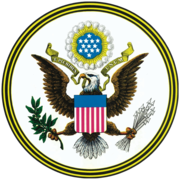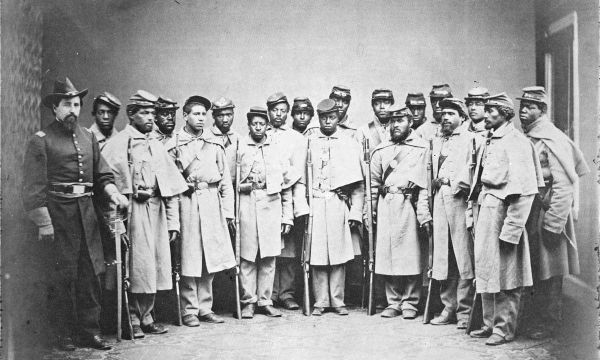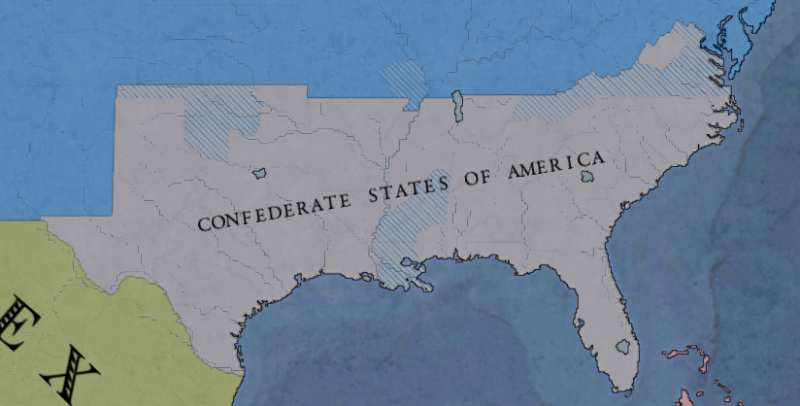IV: Tar Heels
The Battle of Cape Hatteras (L) & CSS
Georgia slides beneath the waves (R)
The only major blue water sea battle of the war took place on July 20th 1862. Just off Cape Hatteras, North Carolina Commodore Breckinridge’s three Confederate raiders, the
Alabama,
Georgia and
Shenandoah engaged with Admiral Chipman’s 15-ship strong squadron in an effort to break out into the Atlantic. With Union troops only days from his temporary harbour at Goose Creek, Breckinridge was forced into the risky action by direct orders from President Davis. Unlike in previous one-on-one encounters that had taken place in late 1861, Chipman had access to several steam-frigates and iron-hull monitors. As such the rebels’ main advantage was nullified. Over several hours the Confederates struggled to escape Chipman’s cordon, while causing only superficial damage to their opponents. Breckinridge’s flagship, the
Georgia, was sunk, with the commodore and the much of his crew rescued by Union ships. The
Shenandoah was badly hit by the USS
Philadelphia and was forced to return to Goose Creek only to be seized by Northern forces in August. The
Alabama however was successful in escaping the blockade. She would spend the autumn attacking civilian shipping around Bermuda before finally being sunk by the ironclad USS
California in late November.
James Ewell Brown ‘Jeb’ Stuart cut a dashing figure. Dressed in a velvet lined cape, a yellow sash and cocked hat sporting an ostrich plume he was the ideal of the Southern dandy made flesh. By the summer of 1862 he was also one of the few commanders in the Confederate army with his reputation still intact. Despite lacking experience above brigade level, a desperate government in Montgomery had effectively put him in charge of the entire Eastern Theatre. Outnumbered, outgunned and with little hope of a clean-cut rebel victory, Stuart proceeded to a launch a guerrilla campaign, hoping to bleed the North’s will to fight. Relying on cavalry and locally raised troops operating semi-independently, Stuart rarely had more than several thousand men under his direct command at any one time. However for the rebel cavalier, the Union had a plain, russet-coated captain to match. Philip Sheridan had risen rapidly from a captain at First Manassas to a major-general in the space of a year. Despite this, and similar to Stuart, he had reached his command less due to his victories as a young cavalry officer and more due to the incompetence of his superiors. Following the removal of Crittenden, then Hayes after his botched capture of Richmond and with Clemens being sent west to deal with Jackson, Sheridan was simply the most noted commander left in the East. It was nonetheless a sound choice and Sheridan quickly proved equal to the wily Stuart.
Major General Philip Sheridan
The two men pursued each across the Carolinas, all notions of frontlines tossed aside as Stuart rode as far north as Virginia (briefly liberating Staunton in the process) and Sheridan as far south as Florida. While the campaign provided plenty of newspaper fodder, detailing rapid advances and dashing cavalry charges, it soon took on a darker tone as both generals struggled for the advantage. As the Union forces, loosely dubbed the Army of the Carolinas pushed south, Stuart hit hard, destroying bridges, railways, factories and food stores, while his partisans, known to their enemy as ‘Tar Heels’ launched hit and run attacks on their supply lines. Sheridan was ruthless to civilians found aiding the Confederates and he instituted martial law across the region. The Northerners also had to deal with the issue of ex-slaves. Following the institution of ‘war contraband’ by Nathaniel Farnsworth, word had quickly spread across the South that slaves could find protection and employment with the advancing Union armies. Sheridan took this a step further and controversially began handing abandoned farm land to freemen, as well as arming them to act as scouts and defend their new plots from Stuart’s raiders. Many on both sides were horrified at the institution of ‘negro tyranny’ by Sheridan, but the general claimed it was simply to provide a secure food source for his men.
The policy coincided with President Lincoln’s Emancipation Proclamation which took effect on August 1st 1862. A war measure made without Congress, it was issued following the fall of Richmond when it became apparent Davis intended to drag the rebellion on. It did not outlaw slavery or make slaves citizens but declared all slaves in areas under Confederate control to be freemen and for all Union commanders to accommodate them as possible [1]. This was not only a strike against the Southern economy but by making the war one for abolition destroyed pro-rebel sentiment in Europe. Despite some controversy it helped energise the war effort and the Congressional mid-term elections in November saw the ‘Copperhead’ Peace Democrats routed. In Montgomery reports flooded in. Although the feared slave revolts failed to materialise, everything from ‘go slows’ on plantations to mass flights north were obvious results from the Proclamation. It was around this time the Confederate government began considering drastic action, namely the ‘nationalisation’ of the black workforce to shore up Southern war industries and even to serve as troops. This was illegal under the nation’s constitution. Prior to New Orleans’ occupation, the freeman Louisiana Native Guards had been raised voluntarily to fight for the South only to be rejected for duty [2]. Despite the gloomy situation, President Davis held off circumventing the entire basis of his nation for the time being.
Men of the 1st Louisiana Native Guard
In New Orleans, Farnsworth had proven a force unto himself. A cunning strategist in the public realm if not on the battlefield, he had grasped every political opportunity presented to him. Originally given only 15,000 men for the occupation, Farnsworth had quickly enlisted black freemen and liberated slaves, (including the Louisiana Native Guards) swelling his army to almost 30,000 by June 1862. This allowed him to advance north and capture the key river junction at Vicksburg making him one of the most celebrated generals of the war, despite his lack of serious opposition. In the city he had divided opinion. He devised a plan for poor relief, demanded oaths of allegiance from anyone who sought any privilege from government, and confiscated weapons. In an ordinary year, it was not unusual for as much as 10% of the city's population to die of yellow fever. In preparation, Farnsworth imposed strict quarantines and introduced a rigid program of garbage disposal. As a result, in 1862, only two cases were reported. Despite this he quickly became known for his draconian rule. Newspapers were heavily censored and in the case of the
Commercial Bulletin closed for a sympathetic obituary for the editor’s father, a Confederate officer. Following his execution of a civilian for tearing down the United States flag on the city mint, President Davis issued a writ for Farnsworth, deeming him a felon deserving capital punishment [3].
In Kentucky, Clemens had once again bested Jackson’s numerically inferior forces, pushing over the border into Tennessee by late August. The eastern portion of that state was the epicentre of Unionist feeling in the South and Jackson’s bedraggled troops found no warm welcome as they retreated through the area. On September 3rd 1862 near Knoxville, the Confederate army found itself surrounded and outnumbered almost 10-to-1. After several preliminary probes against his lines, Jackson accepted the inevitable and surrendered his sword to Clemens. Despite the hopelessness of his position, ‘Yellow Jackson’ was demonised in the Confederate press. Any hope the rebel war effort in Tennessee was finished was soon snuffed by the arrival of Kirby Benning at the head of 18,000 fresh troops in Memphis later that month. Benning had been one of Stuart’s staff officers and quickly began imitating his indirect style against Clemens, who struggled to respond. Some more positive news for the Confederacy came in from the west. Near Oklahoma City Lee had given Grant a bloody nose before continuing his retreat into Texas. Meanwhile the city of Malden held out, its leaders declaring themselves the true state government and calling on all Missourians to rebel against Northern ‘occupation’. It would not be until the arrival of Tecumseh Sherman in January that Malden would finally fall.
The Confederacy, September 1862.
[1] This was explicitly so as not to effect slaves in Union states such as Maryland and Missouri and alienate their leaders.
[2] OTL
[3] Replace Farnsworth with Benjamin Butler and this is OTL.
 I'm also excited to hear that you'll be having some generals switch to politics after the war. As you may have gathered from my own writing, I very much like poltical history, so I await the coming developments eagerly.
I'm also excited to hear that you'll be having some generals switch to politics after the war. As you may have gathered from my own writing, I very much like poltical history, so I await the coming developments eagerly.






